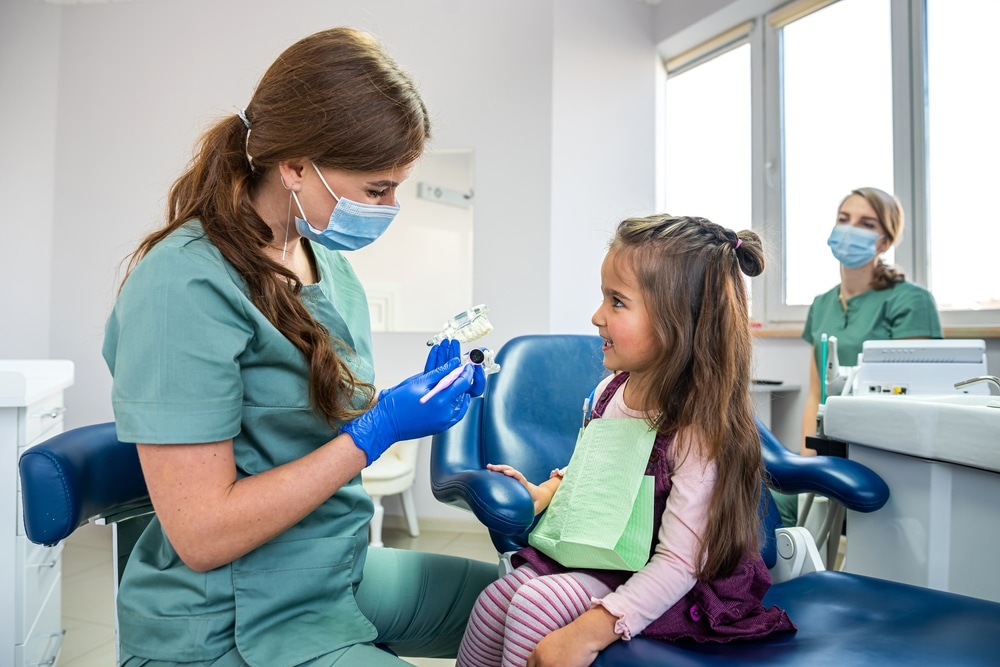Few people can say that they enjoy going to the dentist, but, as adults, we all know it’s important for our oral health. For children going to the dentist can be a fearful experience, especially if they cannot comprehend just how important these visits are. To help ensure their teeth stay healthy, there are ways to deal with their anxiety and make them feel more comfortable about preventative care appointments.
What causes children to have anxiety at the dentist?
It’s common for young children to have anxiety when visiting a medical office, especially a dentist. The reason depends on a few different factors and varies with each child. Here are some of the more common reasons children might be afraid of going to the dentist.
Painful procedures
One of the biggest reasons your child may experience anxiety when receiving dental care is because of a past procedure they may have had that caused them pain. Children don’t like pain, and when they experience it during a dental procedure, they’re likely to connect that pain with the dentist themselves. This causes them anxiety when visiting a dental office because they’re afraid of experiencing more pain, even if it’s only a normal exam.
Sensory issues
Some children deal with sensory issues like being scared, triggered, or overwhelmed by certain sounds, smells, and sometimes the feeling of certain materials, like gauze. The sounds that could trigger their anxiety include the drilling and noises made by other patients in the office getting painful procedures done. We offer compassionate and specialized care for our special needs patients who may have a particularly high level of anxiety when attending dental appointments.
Tips to help ease their anxiety at the dentist
Children will need to continue seeing their dentist to keep their teeth healthy, so it is important that they reach a stage where they are comfortable going in for these visits. If the child has anxiety, there are ways to help relieve their fears, so the dentist can still perform an exam without causing trauma to the child.
Discuss what they can expect at an upcoming visit
To help ease anxiety, you can discuss with your child what the visit might be like. Give them a comprehensive overview of the appointment from the moment you check in, to the moment you leave. Reiterate this process to them a few times before the visit, starting at least a week prior. This allows the child to process their fears and to ask questions regarding the appointment. By the time the visit comes, they should be less fearful than if you were to spring it on them at the last second.
Stick to regular dental visits and promote good oral hygiene
You’ll want to make sure you continue to take your child to each of their routine dental appointments to help them become acquainted with the dentist, dental hygienist, and all the other staff. You should begin taking them by the time they reach one year of age, or when their first tooth appears. Infant oral care can get them comfortable with oral hygiene as they get older. Also, consider offering positive reinforcement as an incentive to go to the dentist. Allow them to be nervous, but offer some kind of prize for their bravery and to help them see that going to the visit isn’t all that bad.
Help your child establish good brushing routines every day. This way they’ll keep their teeth strong, which will help keep them from having to have some of the more uncomfortable procedures down the road, which would otherwise cause anxiety.
Choose the right dentist for your child
Not all those in kids’ dentistry are made the same. You’ll want to make sure the one you’re interested in checking out is the right one for your child. In this case, you’ll want one that specializes in children of all ages, which you can find here at Sprout Kids Dentistry, a pediatric dentistry in Boston MA.
Schedule a Consultation
To help alleviate your child’s fears of the dentist’s office schedule a consultation with us and get to know our staff. Dr. Anderson, our clinic’s dentist is board-certified by the American Board of Pediatric Dentistry and knows exactly how to work with children to alleviate their fears. Contact us today for any questions you may have.
Back to Blogs




